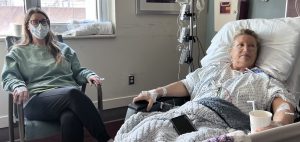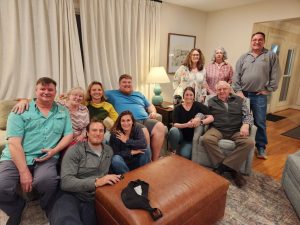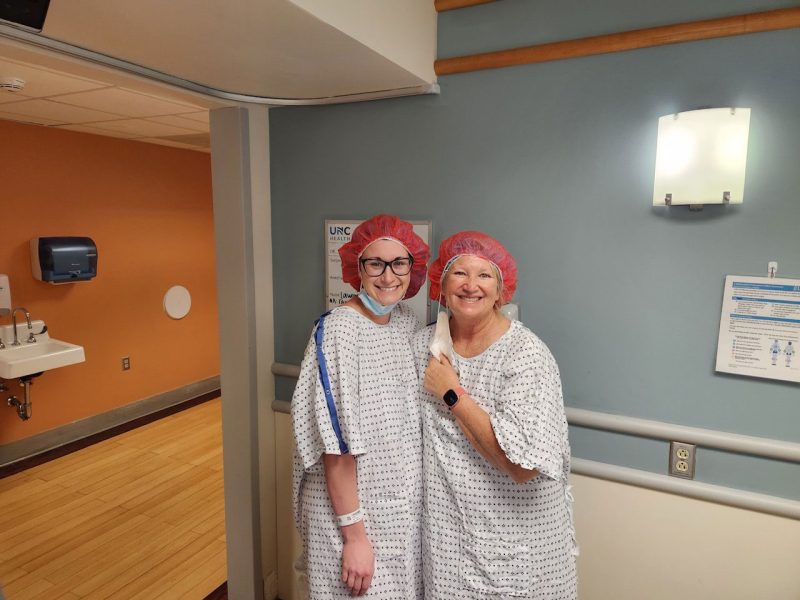Aly Hill, a medical assistant at a urology office in Wilmington, North Carolina, never thought that her job would lead her to one of the most personal decisions of her life. However, after meeting Patricia “Pat” Donovan-Brandenburg, a patient in desperate need of a kidney, Aly felt compelled to help.
“She was a patient of mine,” said Aly. “The doctor that I worked for removed one of her kidneys because she had a tumor on it. After that, she came in regularly for her follow-up appointments, and over time I got to know her. Eventually she started having renal failure in her remaining kidney. She told me her friends were going through the process of trying to become living donors, but for one reason or another, it never worked out.”
Pat’s kidney health continued to decline, and no match could be found. It wasn’t until 2021 that Aly considered the possibility of becoming a living donor herself.

“I was in the process of going through a weight loss journey,” Aly recalled. “I applied to be her donor but was denied because my BMI was off by 1%.”
After that, Aly shelved the idea until yet another potential donor for Pat was disqualified. She decided to reapply—and this time, she was accepted.
“I didn’t tell her I was going to do it,” said Aly. “When I found out I was accepted, I got to share the news with her. She was emotional and excited but tried to contain it, having faced so many disappointments before.”
After being approved as a match, Aly began the process of undergoing various medical tests, many of which could be conveniently done in Wilmington.
“Pat came with me to most of my appointments,” said Aly, adding that the two grew even closer during this time. Their journey included trips to Chapel Hill for final testing and meetings with doctors, all made easier by the support programs that helped cover travel, lodging, and even lost wages.
Aly underwent surgery to donate her kidney on February 21, 2023, taking two weeks off work to recover. Thanks to the assistance program, Aly didn’t have to worry about financial strain, allowing her to focus on her recovery and on Patricia’s health.
“Today, Patricia is doing really well,” said Aly. “Although she never had to go on dialysis, she was constantly fatigued and had muscle cramps before the surgery. Now, she has energy, and her life has drastically improved. Her kidney function now is the best that it’s been since she was in her 30s, before she started having kidney issues.”
Since the donation, Aly and Patricia have grown even closer. “I gained another family through the whole process,” said Aly. “I didn’t know her parents or siblings before, but now they are like my own. Her son hugged me after the surgery, and we see each other often. It’s really humbling.”
Aly admitted to some nerves before the surgery, primarily about the anesthesia, as she had never had surgery before. But her professional background in urology gave her the confidence she needed to move forward.
“I’ve always had a strong calling to help people, and this felt like taking that to another level,” said Aly. “There’s a lot of misconceptions with living organ donation, and a lot of people think that it changes your life in this big way—and it does, but not from a health standpoint.”
Aly’s recovery went smoothly, though she does notice increased fatigue if she doesn’t drink enough water. Aside from that, she feels no lasting physical effects from the donation.

“I truly do feel blessed. Her son hugged me and when I woke up from surgery and her whole family was in the room,” Aly said, through tears. “I knew Pat, but I didn’t know her family until we went through this whole process. Her parents are both still living, so I’ve gained grandparents. I’ve gained three more brothers. I probably see them all once a week, and we all get along super well. My best friend was involved a lot during the whole process, and she’s gotten really close with Pat and her family, as well. Pat calls us her daughters that she never had, because she has all boys.”
For anyone considering becoming a living organ donor, Aly has simple advice: “Talk to someone who’s done it. Speaking with someone who’s been through the process, especially if they’re close to your age, really helps. If you have a giving heart, this will change your life in the best possible way.”
Over 100,000 people in the United States are waiting for a lifesaving transplant. Whether you choose to be a living donor or a donor after death, you can make a difference. Register your decision to be an organ, eye, and tissue donor today at honorbridge.org/registerme




